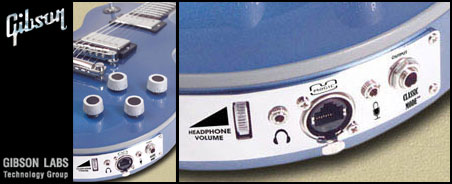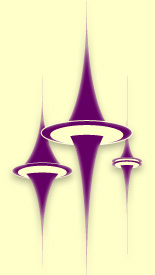Music Trends
../ The Gibson Digital Guitar:
A Revolution...50 Years In The Making
Gibson gets set to introduce their next-generation electric guitar
The Gibson Les Paul guitar revolutionized music with its introduction fifty years ago. From Jimmy Page and Neil Young to Slash and Joe Perry, the
Gibson Les Paul has long been the industry standard. The technology behind that guitar - magnetic pickups converting string vibrations into electrical
impulses - has remained largely unchanged over its lifetime.
Led by CEO Henry Juszkiewicz, Gibson is preparing for a product launch that could send shockwaves throughout the music business. The Gibson Digital
Guitar will be made available to the public later this year, and it is expected to provide guitarists with unparalleled control over their sound. In
a 45-minute interview with Juszkiewicz, I learned a tremendous amount about the Digital Guitar, and came away with the conclusion that it has the
potential to revolutionize the guitar industry.

The Gibson Digital Guitar will feature two outputs: one digital, the
Magic, ethernet style connection, and one analog, dubbed Classic Mode, as well as a headphone jack and mic input for practicing.
The concept of a digital guitar is not a new one. Casio, Roland and Ibanez all introduced MIDI guitars in the
late 1980's, but a lengthy conversation with Juszkiewicz revealed just how different the Gibson product will be
from its not-really-digital predecessors.
The idea behind a MIDI guitar is that a musician can "plug it into their Proteus and make it sound like a tuba."
The Digital Guitar is different in that the entire focus was to improve the process by which the performance is
captured and transmitted to amplifiers, effects processors and recording devices.
Juszkiewicz explained that Gibson's production process for the Digital Guitar essentially "does things that pros
have done to their instruments for years. The electronics is just a circuit board and some connectors. We are
concentrating on what the player does and preserving it as authentically and with as much precision as possible."
Unlike the MIDI guitars, Gibson's digital guitar is designed to sound like a guitar. It is not a MIDI controller,
but is instead a traditional guitar that possesses some revolutionary new functionality. While it's certain that
software will make it possible for the guitar to sound like a tuba, that's not Gibson's focus. Instead, they looked
for ways to increase the scope of what a guitar player can do during performance.
For one thing, it will be possible for guitarists to alter sound on a string-by-string basis, thus exponentially
increasing the possibilities for unique sounds. It will also be possible to perform in surround sound by assigning
each string to a different speaker. If done astutely, it will make the listener feel as though he's inside the
guitar.
Juszkiewicz also accentuated some important improvements in the actual sound production process. "In a typical
guitar/mic/amp set up, only a small percentage of frequencies are actually captured, while the rest is harmonic.
We are 0-20khz, and you hear the full range of frequencies."
Though many of those frequencies aren't technically audible to the human ear, their presence does alter the overall
quality of sound. Just as musicians can hear "air" inside their recordings, so too can they hear the impact of sound
compression.
Juszkiewicz explained some of the technological differences as well. "The pickup is right on top of the bridge,
picking up a really strong fundamental frequency, as opposed to a traditional electric guitar that uses the pickup
off the bridge. The fundamental is a half-wave (goes up and down like a jump rope). At the bridge, that's the node
of the frequency. As you get away from it, you're out of phase with the frequency (cancellation effects with the
harmonics), and as you move the pickup across the string, you'll get tonal differences (like a phase effect)."
By focusing on the fundamental sound of the guitar, imperfections and impurities are removed. As a result, the
performance that's captured is a much more accurate representation of what the musician actually played. Rather
than thinking of the Digital Guitar as some kind of new-fangled synthesizer, guitarists should instead look at it
as a super high-resolution instrument geared for performance and recording.
When asked to describe the fundamental sound of the Digital Guitar, Juszkiewicz said "High-end pickup has a very
unique tone, but it's quiet and has a huge dynamic range. 'Hi-fi' is not technically correct, but that's what it
sounds like. I've never heard that much fidelity in an instrument before."
In addition to the enhanced fundamental sound, the Digital Guitar also possesses the traditional Les Paul pickup,
enabling the guitarist to utilize that classic sound in its traditional setting.
The technological innovations are not limited to sound creation, however. There are some very practical applications
that could make the Gibson Digital Guitar the ultimate performance guitar.
"Any person who's played an electric guitar has been zapped," said Juszkiewicz. Amplifiers carry massive amounts
of electricity, and all it takes is one puddle of water for that to be surging through your body.
"Less life threatening - but also very important - is the fact that because there is an integral circuit, many
ground loops develop. The hum of electric lights and giant electro-magnetic currents normally impact your sound, but
with the digital guitar, those effects are negligible. It's the equivalent of pops and clicks from a primitive
electrical system that are eliminated."
By cleaning up the sound capturing process, the Digital Guitar will be a much-improved tool for home studios,
particularly in places where electrical power is inconsistent. "The guitar is linked by digital stream, so it
doesn't receive high-voltage streams," Juszkiewicz continued. "Everything is shielded, so the external environment
does not impact you. You can really prevent many of the things that happen in high impedance systems that electric
guitars are typically affected by."
If you've ever attended a performance where you've had to wait for the guitarist to tune his instrument (sometimes
before each and every song), you're going to appreciate Gibson's "tuning on the fly" functionality. "With the
Digital Guitar, musicians can have algorithms where as the guitar goes out of tune, you can maintain tuning,"
Juszkiewicz explained.
"The signal is a digital stream and can be processed so that it stays in tune, and can introduce new tunings on the
fly. Also, a lot of players will play various tunings (lowering the E string, Nashville tuning, etc.), and the Digital
Guitar will make it possible to do that instantaneously on the fly, even for just a couple of bars or a lead riff.
This has been attempted in the past with motors, but now it's easy with digital processing."
The technology behind the Digital Guitar was developed by their MaGIC (Media-accelerated Global Information Carrier)
division, an initiative backed by Juszkiewicz that has received its share of heckling from the industry. In an interview
in Wired magazine back in 2001, the CEO of a rival company told Greg Milner, "If you can figure out what Henry is
trying to do, let me know." And Peter Swiadon, a product manager for the Roland Corporation, said, "No disrespect
to Henry, but Magic looks like a solution in search of a problem."
Of course, the first naysayer emerged shortly after the arrival of the first inventor, and that's not likely to
change anytime soon. The real challenge for Gibson lies not with product development, but with marketing. How to
convince guitar players that the essential elements of the Les Paul have not been sacrificed? How to convince them
that the guitar is a legitimate instrument rather than a high-priced novelty?
At a likely retail price of $3000, the Digital Guitar requires a substantial financial investment on the part of
the musician, and Gibson is going to great lengths to ensure that customers are comfortable making that purchase.
"We have made it such that the board - and its enormous complexity and functionality - is the size of a credit
card and can be easily removed," explained Juszkiewicz. It is essential that Gibson make the upgrade process both
seamless and affordable. If they fail, they'll run the risk of damaging their excellent reputation.
The Future: If Gibson succeeds both with the launch of this product and the development of subsequent upgrades, the Digital Guitar could
become one of the music industry's most effective loyalty products. Gibson has directed their focus in the right place - they're a guitar company
producing an advanced version of the guitar - and more likely than not, guitar players will welcome the technological breakthroughs it offers. If
the product meets the approval of the musicians' community, look for a similarly revolutionary piano to be released under Gibson's Baldwin piano
division.
>>> Digihear? October 2004
















